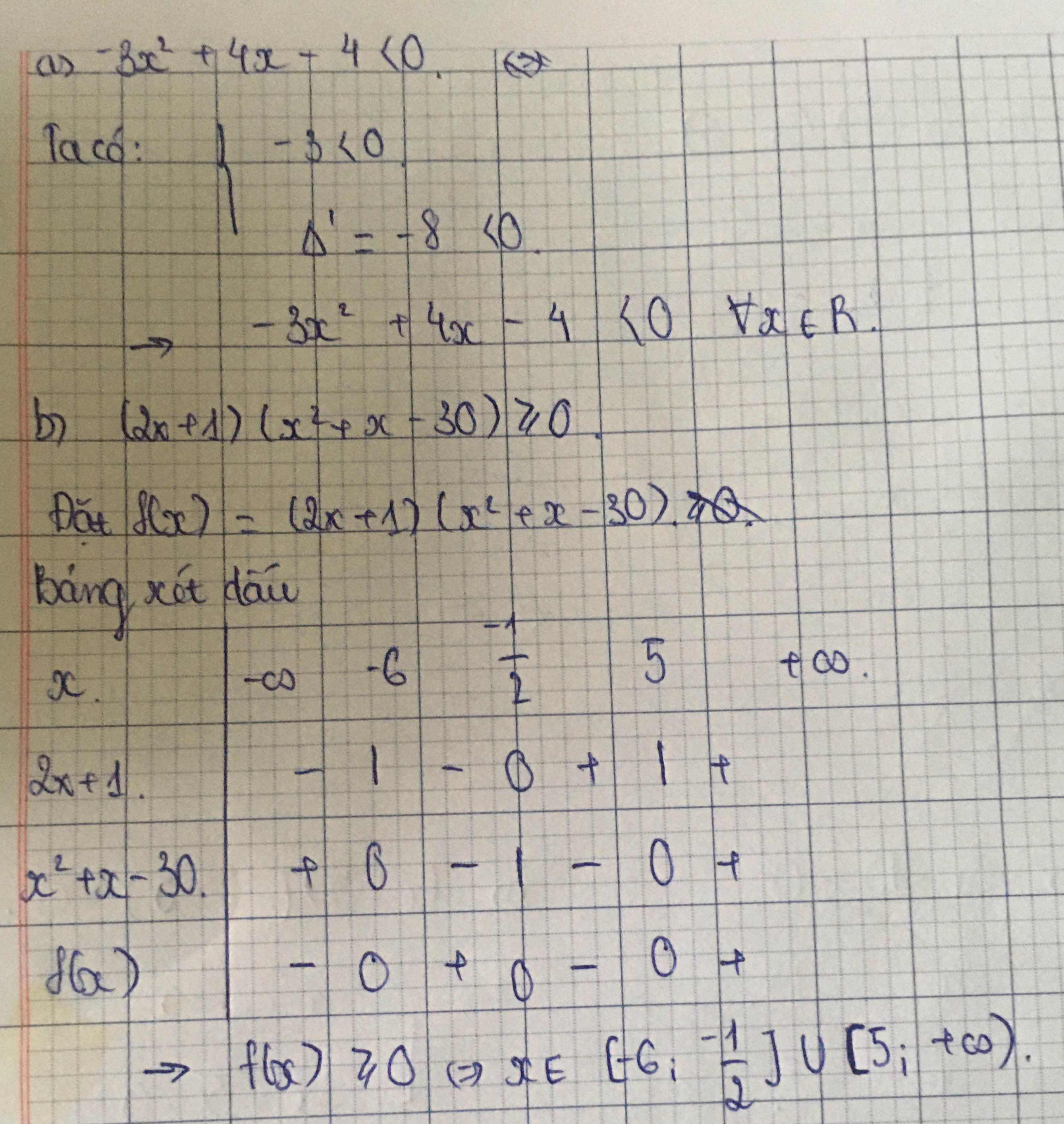giải bất phương trình:
a) -3x2 + 4x - 4 <0 b) (2x + 1) ( x2 +x - 30) ≥ 0
c) 4x + 10x + 6
Hãy nhập câu hỏi của bạn vào đây, nếu là tài khoản VIP, bạn sẽ được ưu tiên trả lời.



a: \(\Leftrightarrow2x\left(x^2+2x+5\right)=0\)
=>x=0
b: \(\Leftrightarrow\dfrac{x}{x-1}-\dfrac{x+1}{x-3}=\dfrac{1}{2}\)
\(\Leftrightarrow x^2-4x+3=2x\left(x-3\right)-2\left(x^2-1\right)\)
\(\Leftrightarrow x^2-4x+3=2x^2-6x-2x^2+2=-6x+2\)
\(\Leftrightarrow x^2+2x+1=0\)
=>x=-1(nhận)
\(a,2x^3+4x^2+10x=0\\ \Leftrightarrow2x\left(x^2+2x+5\right)=0\\ \Leftrightarrow\left[{}\begin{matrix}2x=0\\x^2+2x+5=0\end{matrix}\right.\\ \Leftrightarrow\left[{}\begin{matrix}x=0\\\left(x^2+2x+1\right)+4=0\end{matrix}\right.\\ \Leftrightarrow\left[{}\begin{matrix}x=0\\\left(x+1\right)^2+4=0\left(vô..lí\right)\end{matrix}\right.\)
\(b,ĐKXĐ:\left\{{}\begin{matrix}x\ne1\\x\ne3\\x\ne4\end{matrix}\right.\\ \dfrac{x^2-4x}{x^2-5x+4}-\dfrac{1}{2}=\dfrac{x+1}{x-3}\\ \Leftrightarrow\dfrac{x\left(x-4\right)}{\left(x-1\right)\left(x-4\right)}-\dfrac{1}{2}=\dfrac{x+1}{x-3}\\ \Leftrightarrow\dfrac{x}{x-1}-\dfrac{1}{2}-\dfrac{x+1}{x-3}=0\\ \Leftrightarrow\dfrac{2x\left(x-3\right)}{2\left(x-1\right)\left(x-3\right)}-\dfrac{\left(x-1\right)\left(x-3\right)}{2\left(x-1\right)\left(x-3\right)}-\dfrac{2\left(x+1\right)\left(x-1\right)}{2\left(x-1\right)\left(x-3\right)}=0\)
\(\Leftrightarrow\dfrac{2x^2-6x}{2\left(x-1\right)\left(x-3\right)}-\dfrac{x^2-4x+3}{2\left(x-1\right)\left(x-3\right)}-\dfrac{2x^2-2}{\left(x-1\right)\left(x-3\right)}=0\)
\(\Leftrightarrow\dfrac{2x^2-6x-x^2+4x-3-2x^2+2}{2\left(x-1\right)\left(x-3\right)}=0\)
\(\Rightarrow-x^2-2x-1=0\)
\(\Leftrightarrow x^2+2x+1=0\\ \Leftrightarrow\left(x+1\right)^2=0\\ \Leftrightarrow x+1=0\\ \Leftrightarrow x=-1\left(tm\right)\)

Bài 1:
a) (3x - 2)(4x + 5) = 0
<=> 3x - 2 = 0 hoặc 4x + 5 = 0
<=> 3x = 2 hoặc 4x = -5
<=> x = 2/3 hoặc x = -5/4
b) (2,3x - 6,9)(0,1x + 2) = 0
<=> 2,3x - 6,9 = 0 hoặc 0,1x + 2 = 0
<=> 2,3x = 6,9 hoặc 0,1x = -2
<=> x = 3 hoặc x = -20
c) (4x + 2)(x^2 + 1) = 0
<=> 4x + 2 = 0 hoặc x^2 + 1 # 0
<=> 4x = -2
<=> x = -2/4 = -1/2
d) (2x + 7)(x - 5)(5x + 1) = 0
<=> 2x + 7 = 0 hoặc x - 5 = 0 hoặc 5x + 1 = 0
<=> 2x = -7 hoặc x = 5 hoặc 5x = -1
<=> x = -7/2 hoặc x = 5 hoặc x = -1/5

3x2 + 2x - 1 = 0
=> 3x2 + 3x - x - 1 = 0
=> 3x(x + 1) - (x + 1) = 0
=> (3x - 1)(x + 1) = 0
=> \(\orbr{\begin{cases}3x-1=0\\x+1=0\end{cases}}\)
=> \(\orbr{\begin{cases}x=\frac{1}{3}\\x=-1\end{cases}}\)
x2 - 5x + 6 = 0
=> x2 - 2x - 3x + 6 = 0
=> x(x - 2) - 3(x - 2) = 0
=> (x - 3)(x - 2) = 0
=> \(\orbr{\begin{cases}x-3=0\\x-2=0\end{cases}}\)
=> \(\orbr{\begin{cases}x=3\\x=2\end{cases}}\)
3x2 + 7x + 2 = 0
=> 3x2 + 6x + x + 2 = 0
=> 3x(x + 2) + (x + 2) = 0
=> (3x + 1)(x + 2) = 0
=> \(\orbr{\begin{cases}3x+1=0\\x+2=0\end{cases}}\)
=> \(\orbr{\begin{cases}x=-\frac{1}{3}\\x=-2\end{cases}}\)
1, \(3x^2+2x-1=0\Leftrightarrow3x^2+3x-x-1=0\)
\(\Leftrightarrow3x\left(x+1\right)-\left(x+1\right)=0\)
\(\Leftrightarrow\left(x+1\right)\left(3x-1\right)=0\)
\(\Leftrightarrow\orbr{\begin{cases}x+1=0\\3x-1=0\end{cases}\Leftrightarrow\orbr{\begin{cases}x=-1\\x=\frac{1}{3}\end{cases}}}\)
2, \(x^2-5x+6=0\Leftrightarrow x^2-2x-3x+6=0\)
\(\Leftrightarrow x\left(x-2\right)-3\left(x-2\right)=0\)
\(\Leftrightarrow\left(x-2\right)\left(x-3\right)=0\)
\(\Leftrightarrow\orbr{\begin{cases}x-2=0\\x-3=0\end{cases}\Leftrightarrow\orbr{\begin{cases}x=2\\x=3\end{cases}}}\)
3, \(3x^2+7x+2=0\Leftrightarrow3x^2+6x+x+2=0\)
\(\Leftrightarrow3x\left(x+2\right)+\left(x+2\right)=0\)
\(\Leftrightarrow\left(x+2\right)\left(3x+1\right)=0\)
\(\Leftrightarrow\orbr{\begin{cases}x+2=0\\3x+1=0\end{cases}\Leftrightarrow\orbr{\begin{cases}x=-2\\x=-\frac{1}{3}\end{cases}}}\)

a: =>5x-5+17x=1-12x-4
=>22x-5=-12x-3
=>34x=2
hay x=1/17
b: =>\(\left(x-3\right)^2-4x\left(x-3\right)=0\)
=>(x-3)(-3x-3)=0
=>x=3 hoặc x=-1
c: =>(x-4)(x-6)=0
=>x=4 hoặc x=6

\(a.x^2-4x+4=0\)
\(\left(x-2\right)^2=0\)
=>x=2
b) \(2x^2-x=0\)
\(x\left(2x-1\right)=0\)
=> \(\left[{}\begin{matrix}x=0\\x=\dfrac{1}{2}\end{matrix}\right.\)
c) \(x^2-5x+6=0\)
\(x^2-2x-3x+6=0\)
\(\left(x-2\right)\left(x-3\right)=0\)
=> \(\left[{}\begin{matrix}x=2\\x=3\end{matrix}\right.\)
d) \(x^2+y^2=0\)
Vì \(x^2,y^2\ge0\forall x,y\)
=>x=y=0
e) \(x^2+6x+10=0\)
\(\left(x+3\right)^2+1=0\)
Vì \(\left(x+3\right)^2\ge0\forall x\)
=> VT>0 \(\forall x\)
=> phương trình vô nghiệm